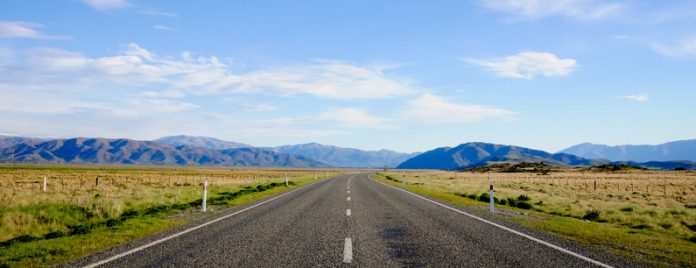Like Australia, New Zealand is another country where UK drivers are likely to feel reasonably at home on the roads. New Zealanders drive on the left, and the Highway Code and street signs are virtually identical to those of the UK.
The biggest difference is likely to be in the sheer variety of driving conditions that you encounter: New Zealand’s climate tends to have greater extremes than Britain’s, and the country has many unmade roads – or, as the locals say, ‘unsealed’ roads. So it’s always a good idea to ensure you’re fully prepared for the journey ahead.
Driving basics
The minimum age for driving in New Zealand is 16.5 years old, though to hire a car you will need to be at least 21, and to have been in possession of a full driving licence for at least a year. Note that some hire companies won’t rent to drivers over the age of 70.
When you are driving, the only documentation you’re legally obliged to carry is your driving licence, as long as it’s in English – otherwise you will need an International Driving Permit as well. But it’s a good idea to carry your insurance and MOT documents with you just in case, as this will make life simpler in the unfortunate event of an accident. You will also need to convert your UK licence to a New Zealand one if you’re in the country for longer than 12 months.
Speed Limits and Seat Belts
The speed limit in New Zealand is generally 50km/h (30mph approx) in built-up areas, and up to 110km/h (68mph) on highways and motorways. But be aware of road and weather conditions at all times, and remember to adjust your speed accordingly: New Zealand roads can often be quite steep and twisting, and become hazardous in wet weather or when visibility is low. On some roads you may also see signs saying ‘LSZ’. This stands for ‘low speed zone’, and you should therefore reduce your speed.
Seatbelts are compulsory in New Zealand for the driver and all front and rear passengers, and all children up to the age of 15 must be supplied with appropriate child seats or belts. Failure to comply with these regulations can result in a fine of up to NZ$150.
Drink-driving and Mobile Phones
The blood alcohol limit is lower than in the UK at 0.05%, so driving after you’ve consumed any alcohol at all is strongly discouraged. Using your mobile phone while driving is also against the law, though hands-free kits are permitted.
Roads and Weather in New Zealand
As stated at the start, it’s the roads themselves and the weather that are likely to present UK drivers with the greatest difficulties when driving in New Zealand. But if you prepare adequately for your journey, you should be fine.
The first thing to be aware of is that New Zealand as a whole is much less built-up and developed than the UK, and the roads (especially if unmade) may be slower-going than you’re used to – so allow plenty of time for your journey. Anecdotally, some locals suggest that Google Maps tends to underestimate driving times by up to 50%, so bear that in mind when planning your journey.
Local hazards that are particular to New Zealand include the drainage ditches bordering many rural roadsides (which are not always easy to spot when overgrown with long grass, and even less easy to get out of!) and logging trucks, which are best given a wide berth whenever possible.
As for the weather – you’re far more likely to encounter snowy, wintry driving conditions in New Zealand than you are at home, especially on the South Island. So pay attention to local weather reports before setting off, and make sure your car is equipped with snow chains if you think you might need them – and that you know how to fit them! And as always, when driving in rural areas keep an eye out for livestock that may be crossing the road.
If you are travelling in bad weather conditions, it’s also a good idea to ensure someone knows where you’re going, what route you’re taking and roughly what time you intend to arrive. More extensive advice on driving in New Zealand can be found at Wikitravel.
That just about covers all of the basics for driving in New Zealand. If you found this guide helpful, please share it with your friends!
And if you’re planning a move to New Zealand any time soon, you may be interested in our New Zealand car shipping services.










